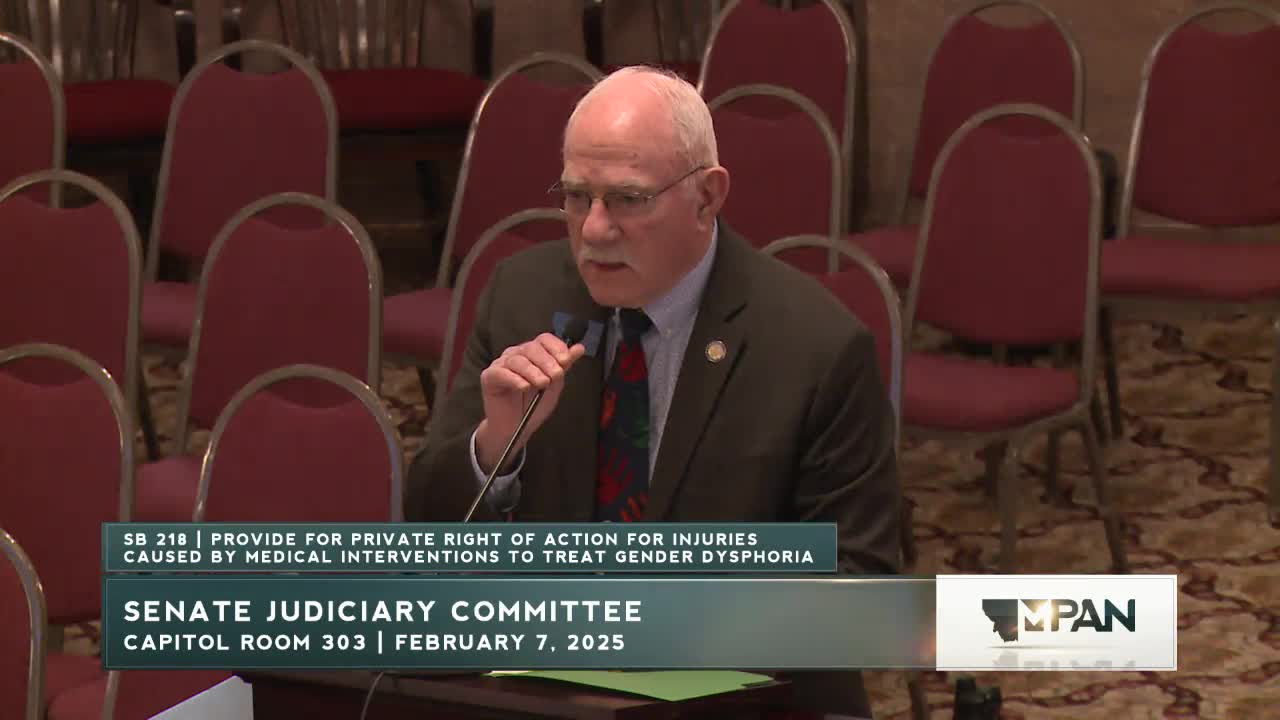Senate committee advances bill creating private cause of action for some gender‑dysphoria medical interventions
Get AI-powered insights, summaries, and transcripts
Subscribe
Summary
Senator John Fuller introduced Senate Bill 218 to allow a private civil cause of action and a 25‑year statute of limitations for some injuries claimed to result from medical interventions for gender dysphoria.
Senator John Fuller, R., introduced Senate Bill 218 to provide a private cause of action for injuries claimed to result from certain medical interventions used to treat gender dysphoria and to establish a 25‑year statute of limitations for such claims.
Proponents framed the measure as an accountability tool for “irreversible” interventions. Derek A. O’Stricker, chief legal counsel for the Montana Family Foundation, said Senate Bill 218 would allow harmed individuals to seek redress and cited examples from Europe and a federal executive order as part of his rationale. Other proponents described cases of people who later regretted medical interventions and urged a longer statute of limitations so those individuals could bring claims.
Opponents included medical providers, hospitals and civil‑liberties groups who said the bill departs from ordinary malpractice law. Testimony against the bill came from representatives of BridgerCare, Planned Parenthood Advocates of Montana, the Montana Hospital Association, the Montana Psychiatric Association, the Montana Academy of Family Physicians and many individual physicians. Those witnesses expressed three consistent concerns: (1) the bill imposes strict liability rather than the negligence standard used in ordinary malpractice cases; (2) a 25‑year statute of limitations is substantially longer than Montana’s ordinary medical‑malpractice limitations (witnesses cited Montana Code Annotated 27‑2‑205, two‑year standard for many malpractice claims); and (3) the combination of extended exposure and strict liability would make malpractice coverage unaffordable, reducing access to care across the state.
Dr. Darren Bell, a family physician who trains residents in Montana, told the committee that creating a separate, long‑running cause of action would deter physicians from practicing in the state and worsen existing rural health‑care shortages. The Montana Hospital Association and the Montana Psychiatric Association warned that the bill would “legislate medicine,” upend customary malpractice procedures and disincentivize doctors from providing a range of services to Montanans, not only gender‑related care.
Supporters replied that detransitioners can take years or decades to recognize harm and that those individuals deserve time to seek justice. Committee members asked detailed questions about definitions, the operation of a strict‑liability standard, and potential unintended consequences—such as suits by an estate many years after care was provided.
During executive action, the committee adopted the bill by roll‑call vote. The record shows the committee vote was 6 in favor, 3 opposed. The committee debate and the roll call reflect a sharp division between proponents of patient accountability and medical groups concerned about workforce and access implications.
Votes at a glance: Senate Judiciary Committee — SB 218, motion to advance (do pass) adopted by roll call (6–3).
